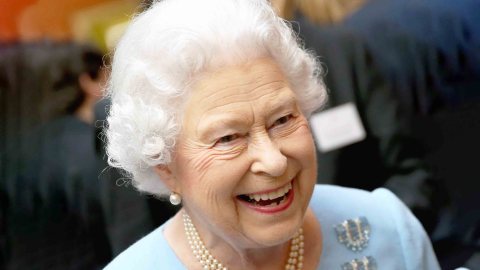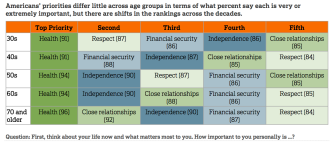How Optimistic Are You? It Probably Depends on Your Age

Many of us worry about getting older. We worry we will miss our youth, or that our health will decline and leave us miserable. Ironically, new research has revealed that the older we become, the more optimistic about life we tend to be. In a recent survey of over 3,000 people, researchers concluded that our level of optimism about life likely depends on our age, and the older we get, the better we feel about our individual lives.
When it comes to being concerned with aging, youth is fleeting indeed. In the survey, all people above the age of 30 gave aging significant thought. And many were worried that the country is not prepared for a growing senior population. About 71% of all the people surveyed are afraid of losing independence as they age, which could take the form of losing memory, or a lack of money.
In a very welcome irony, the poll showed that as the difficulties of aging grew nearer, worries tended to fade, and optimism grew in a variety of ways. Concerns about getting older, having worse health, and concerns about age-related illnesses also fell among respondents with the passage of time.
“The younger generation is less optimistic,” said Dr. Zia Agha, chief medical officer at the nonprofit West Health, which was involved in the polling. ”Perhaps as they age they will build resilience and they build the capacity that will help them cope better.”
The differences in outlook can be quite striking, depending on the age group. 46% of the polled people in their 30s saw themselves optimistic about aging. Compare that to the 66% of people 70 or older who had that attitude.
People also saw the quality of their lives improving beginning in their 50s to 60s and going forward. Two thirds of the respondents who were 70 years and older saw their life as excellent or very good, in comparison to about half of those in their 30s who expressed a similar sentiment.

Source: NORC at the University of Chicago
While there was a clear increase in confidence as individuals got older, feeling more financially secure with every decade of age, the poll did notice a period of time when pessimism appears to grow — the dreaded middle-age period as people leave their 30s. But with time, even these feelings tend to become more optimistic. Interestingly, the respondents aged 70+ years were the least likely to worry about age-related health issues, moving to a nursing home, or being in some way disrespected by others, including their families.
The survey also reflected that as people grow older, their priorities tend to shift. Chief medical officer Dr Agha believes that when people start focusing more on life aspects like spirituality and personal relationships, they receive a boost in happiness even in light of growing physical challenges.
The top priority for every age group was health but as you can see on this chart, the secondary priorities shifted depending between the decades:

Source: NORC at the University of Chicago
Also notable is that the number representing “old age” is a moving target. About 40% of people in their 30s saw 65 years as the point at which old age kicks in. Older individuals, however, felt differently. Only about 20% of people in their 70s felt they had entered old age upon turning 65. It seems how we imagine getting old to feel, and what it actually feels like, are two substantially different things.
The poll, conducted by the research organization NORC and the West Health Institute, involved 3,026 adults 30 and above.
—





